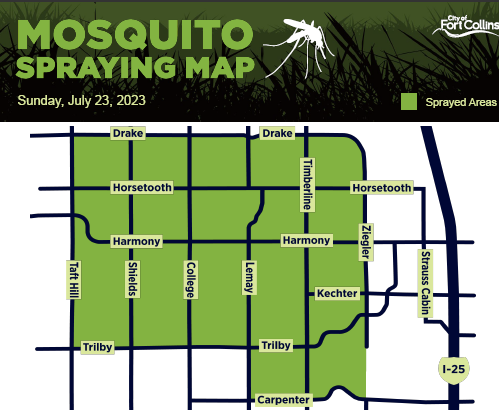Fort Collins to spray after finding high number of West Nile-infected mosquitoes
A high number of West Nile virus-infected mosquitoes have been found in traps around Fort Collins, prompting the city to initiate spraying to reduce the chance of transmission to humans.
An area of south Fort Collins that was found to have the most infected mosquitoes is scheduled to be sprayed on Sunday, July 23, according to a Wednesday press release.
Weather permitting, fogging trucks will work from 8 p.m. to 2 a.m. within these general boundaries:
Taft Hill, Drake, Ziegler and Trilby roads
Lemay Avenue, Trilby, Ziegler and Carpenter roads
To see the spraying map and track fogging trucks, visit www.fcgov.com/westnile/.
To minimize pesticide exposure, residents and their pets should stay indoors and keep doors and windows closed for 30 to 60 minutes after spraying. Residents can further minimize pesticide exposure by covering organic gardens, ponds and water features with a sheet or tarp.

Where other area cities/towns are at with spraying for West Nile virus-infected mosquitoes
Loveland: Mosquitoes testing positive for the virus have been found northeast of Boyd Lake and near the intersection of East First Street and North Boyd Lake Avenue, south of Loveland Sports Park, according to a city news release. Both locations have been sprayed. Spraying continues when certain thresholds are met in areas, according to Vector Disease Control International, which has the contract to spray in the city. The next scheduled spraying was July 19.
Windsor: Has been spraying since early June and will as certain thresholds are met in areas, according to Vector Disease Control International.
Timnath: Does not have active testing but has been spraying since early June and will as certain thresholds are met in areas, according to Vector Disease Control International. The next scheduled spraying is July 20 in the downtown and Serratoga Falls, Trailside, Weitzel Park and Wildwing areas.
Severance: Does not have active testing but spraying has taken place July 5 and 12 with additional spraying scheduled for July 19 and 26 and Aug. 2, 9 and 16, according to Vector Disease Control International.
Wellington: West Nile infected-mosquitoes have not been detected but two spraying treatments have taken place with spraying tentatively scheduled for next week depending on the weather, according to the town. The town focuses its spraying on standing water, including ponds and detention areas. For spraying dates, usually posted three days in advance, visit www.wellingtoncolorado.gov/.
For more information on spraying and other information, visit the Larimer County health department website at larimer.gov/health/communicable-disease/west-nile-virus.
When cities decide to spray: The threat of West Nile virus is rapidly rising in Larimer County
Larimer, Weld counties lead Colorado in human cases of West Nile virus
Larimer County: No. 1 county in reported West Nile virus cases in humans with 1,012 from 2003 when reporting started in Colorado through 2022. About half of those cases occurred in 2003. Last year, there were 15 cases in the county. The last West Nile virus death in the county was 2021.
Weld County: No. 2 county with 860 cases through last year, about half of which occurred in 2003. Last year, there were 35 cases.
A look at human cases of West Nile virus in Colorado
As of July 18, there have been no reported human cases of West Nile virus in Colorado, according to the Colorado Department of Public Health and Environment.
Last year, there were 206 cases, the most since 2013, including 20 deaths, the most since 2003.
The state's worst year was 2003 when there were 2,948 cases, 66 fatalities and 146 who were hospitalized, some of whom have never fully recovered.
Who is most at risk of suffering from West Nile virus
Those ages 50 and older and those who have serious diseases and immune disorders are more likely than younger patients to have the most severe forms of the disease, according to Larimer County health department.
Chances of suffering the ill effects of West Nile virus
One in 150 people infected with West Nile virus will develop severe illness. Symptoms develop three to 14 days after infection and can include high fever, headache, neck stiffness, stupor, disorientation, coma, tremors, convulsions, muscle weakness, vision loss, numbness and paralysis. These symptoms may last several weeks, and neurological effects may be permanent.
20% who become infected develop symptoms, including fever, headache, body aches, nausea, vomiting and sometimes swollen lymph glands or a skin rash on the chest, stomach and back.
80% who are infected with the virus will not show any symptoms.
What you can do to reduce mosquitoes and their bites
Culex mosquitoes can lay eggs in as little as 2 inches of water.
Drain items such as bird baths, containers and kiddie pools.
Use DEET or other effective mosquito repellent.
Avoid exposure during peak Culex mosquito feeding times, which are dusk through dawn.
Wear long sleeves and pants to reduce skin exposure.
This article originally appeared on Fort Collins Coloradoan: When Fort Collins, others will spray for West Nile mosquitoes
